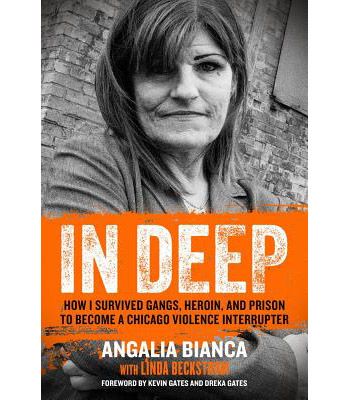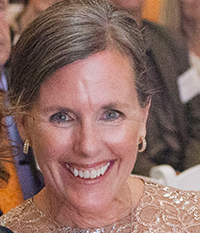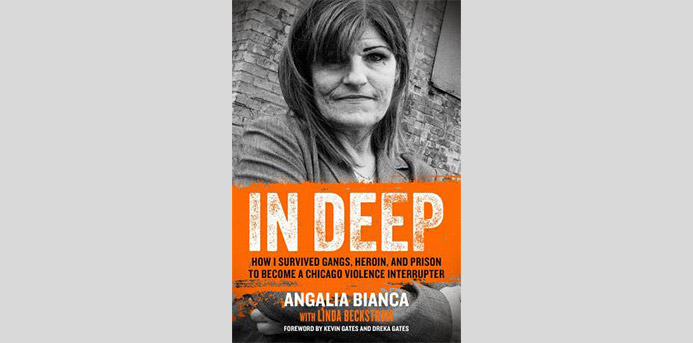Angalia Bianca‘s life story is proof that truth can be far more engaging than even well-crafted fiction. Bianca grew up in Oak Park, and her teenage runaway adventures included trips out West and to the Ozark Music Festival. But life took a turn, leading her to heroin and other drug addiction, homelessness, gang membership, and prostitution. Even multiple trips to prison couldn’t break her unhealthy ways.
 Bianca’s story of redemption and work as a violence interrupter is as inspiring as her life journey up to that point is shocking, as you can read in her recently published biography “In Deep: How I Survived Gangs, Heroin, and Prison to Become a Chicago Violence Interrupter.”
Bianca’s story of redemption and work as a violence interrupter is as inspiring as her life journey up to that point is shocking, as you can read in her recently published biography “In Deep: How I Survived Gangs, Heroin, and Prison to Become a Chicago Violence Interrupter.”
Bianca’s book launch was hosted at The Arts Club of Chicago, an auspicious debut indeed. She later returned to tell her compelling story to Make It Better for this Q&A.
Make It Better: Please define “Violence Interrupter.”
A violence interrupter is a person with street credibility who is respected in the community they are working with. Because of close ties with the community, violence interrupters are able to intervene in potentially violent situations that could lead to gun violence by peacefully mediating the conflict. Violence interrupters work in communities that they were once associated with; some are former gang members who were once involved in gang violence themselves, but who have now changed their lives and work to prevent and literally interrupt violence.
What organizations have you worked with or do you champion?
Acclivus Inc., A Safe Haven, Life After Hate, Free Radicals Project, Good News Partners, Enlace Chicago, ALSO Chicago, [and] BUILD Chicago.
What are your hopes and dreams for the short-term and long-term future?
I want to continue working with at-risk youth to inspire them and give them hope for the future.
I want to start my own not-for-profit organization working to connect resources to families and children in poverty-stricken communities in Chicago and beyond.
You start your book with your mother deserting you. She left you and your younger sister alone in your home knowing that your father likely wouldn’t be home for several hours. How do you think this affected your development?
My mom left when I was 5 years old and my younger sister was 1 year old. I was devastated and had what I now know are abandonment issues throughout my life.
Girls and women in America today enjoy greater power and status now than when you were growing up. Had you had more powerful female role models as a youth, do you think this would have affected your development too?
Yes! When I was a child I always said I was going to make a difference when I grew up. I used to say I wanted to be a lawyer and do great things to help people. My grandma, who raised me, was a strong woman with limited education and professional skills. She grew up in poverty during World War II and her family came to the United States from Sicily. So while I had lots of love, I didn’t have any role models who were women out in the world as professionals. It might have made a difference for me to be close to a woman who was successful in her own right in a legitimate way.
Are there other cultural norms from your youth that, if changed, would have helped you avoid such a self-destructive path?
Perhaps if more educational programs directed toward young girls were available in schools as they are now, that might have made a difference. Also, attention disorders like ADHD were not understood or diagnosed and treated when I was young. I believe I might have been diagnosed with an attention disorder since I was a very hyper active kid and that might have made a difference in how I focused. I was always bored and restless in school.
What do you consider to be your low point outside of prison? Why did it take your father’s death to snap you out of the addiction, drugs, prostitution, homelessness lifestyle?
I would say my low points outside of prison came when I was homeless and still addicted to heroin.
When I learned of my father’s death while still in prison, it made me realize and therefore face my own mortality. I realized that we all have to die one day and the more I thought about it the more I started to understand that I would die alone in the streets from a bullet or a drug overdose if I didn’t change my life somehow.
Please tell us about Neli Rowland and A Safe Haven. What did this institution do differently than others, which helped you break the cycle?
A Safe Haven is different because it wasn’t a typical shelter for homeless people where they make you leave every morning and come back at night. When I went to ASH after I got out of prison I had a room and a warm bed and three meals a day. They had the kind of programs and resources that I needed to learn how to change my life. I saw many people who I remembered from the streets who worked at ASH and changed their lives. They inspired me and gave me hope that I could change and have a healthy, productive life, too.
When I first met Neli in 2012 I was so inspired by her. It’s like we bonded from the start. I wanted to become professional like her. She has always been there for me and continues to help me grow and succeed.
Please tell us what you love best about being a Violence Interrupter.
I love interacting with young people and sharing my own experience in the hope of helping them make better decisions. The best part is when I know I have stopped somebody from pulling the trigger, and even more gratifying is when a mother thanks me for saving her baby’s life.
Please tell us what to watch for on the streets in order to see when others need help and it is safe and wise to intervene too.
I am reluctant to encourage an untrained individual to ever get involved in a potentially violent situation. However, I do urge people to help the homeless with money, food, and clothing whenever possible and to support any of the many community organizations that work to prevent violence and help both victims and young people who become involved in violence.
Please tell us anything else you want our audience to know.
I am honored to have had the opportunity to tell my story in an honest and open way through the publication of my book so that others can find hope and understand that people can and do change. I am humbled when readers contact me with their own stories or stories of loved ones who need help and tell me that I have given them hope. This is why I wanted to write a book and why I believe my story can help others.
Evanston Public Library will host an author event with Bianca and co-author Linda Beckstrom on March 11. Learn more.
More from Make It Better:
- Local Author Pens New Book About ‘One of America’s Most Infamous Crimes’
- Better Makers: Children’s Ball Raises Record Funds for Transformative Pediatric Research at Lurie Children’s Hospital
- Harvard’s Todd Rose: Why We Need to Redefine the Way We Think About Success — And What Parents Can Do to Help Kids Find New Paths to Fulfillment
 Susan B. Noyes is the Founder & Chief Visionary Officer of Make It Better Media Group, as well as the Founder of Make It Better Foundation’s Philanthropy Awards. A mother of six, former Sidley Austin labor lawyer and U.S. Congressional Aide, passionate philanthropist, and intuitive connector, she has served on boards for the Poetry Foundation, Harvard University Graduate School of Education Visiting Committee, American Red Cross, Lurie Children’s Hospital, Annenberg Challenge, Chicago Public Education Fund, Lyric Opera of Chicago, Chicago Symphony Orchestra, New Trier High School District 203, and her beloved Kenilworth Union Church. But most of all, she enjoys writing and serving others by creating virtuous circles that amplify social impact.
Susan B. Noyes is the Founder & Chief Visionary Officer of Make It Better Media Group, as well as the Founder of Make It Better Foundation’s Philanthropy Awards. A mother of six, former Sidley Austin labor lawyer and U.S. Congressional Aide, passionate philanthropist, and intuitive connector, she has served on boards for the Poetry Foundation, Harvard University Graduate School of Education Visiting Committee, American Red Cross, Lurie Children’s Hospital, Annenberg Challenge, Chicago Public Education Fund, Lyric Opera of Chicago, Chicago Symphony Orchestra, New Trier High School District 203, and her beloved Kenilworth Union Church. But most of all, she enjoys writing and serving others by creating virtuous circles that amplify social impact.

